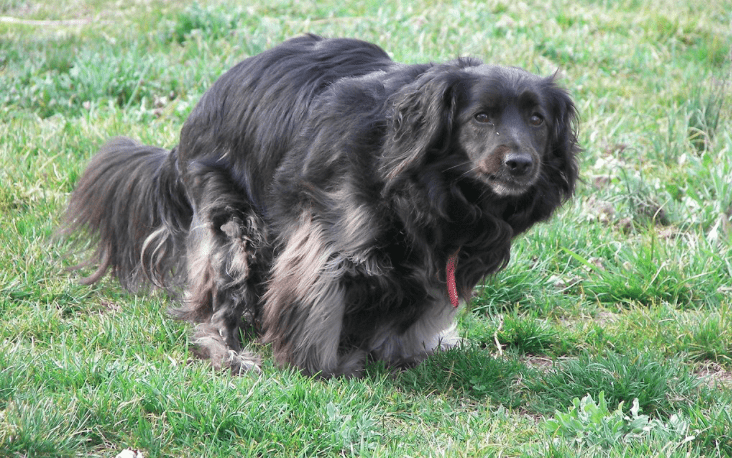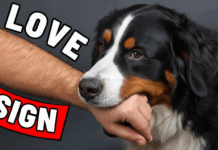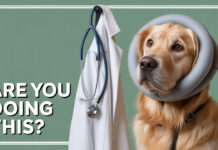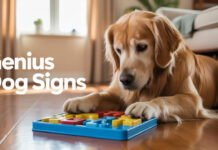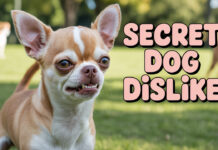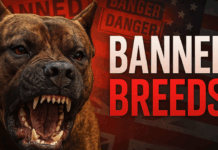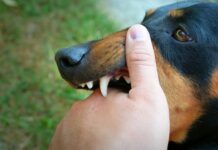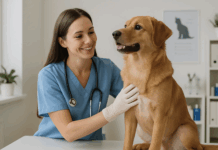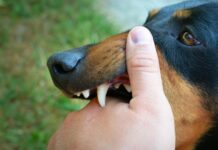Last Updated on June 15, 2021 by Dogs Vets
My Dog Eats Poop How Do I Clean His Mouth?
Quick cleaning method
1. Give food and water:
Give your dog water and food. Your dog will produce saliva when he eats, which naturally cleans his mouth, and water naturally flushes out germs and debris.
2. Give dental chewing treats: The saliva cleans your puppy’s mouth naturally, and the dental treat creates friction to remove debris.
3. You can use a piece of cloth or damp a face cloth with water or with saline or coconut oil and wrap your finger around it. Hold the puppy and place the cloth inside of the puppy’s mouth and clean it.
4. Wipe the mouth of your puppy’s upper and lower gums, the roof of the mouth, and the tongue while you hold your puppy still. Don’t stick your finger too far into the mouth, you don’t want your puppy to vomit.
5. Use mouthwash: Remember to only use a puppy mouthwash that is commercially available, added to water or wiped with a cloth. Do not use human mouthwash.
Brushing method
1. Get a suitable toothbrush. If you have one, use a dog toothbrush as they are specifically designed for each side of your dog’s teeth. If you don’t have one handy, use a baby toothbrush.
2. Use dog toothpaste Apply dog toothpaste to the brush, always make sure you do not use human toothpaste.
3. Access to teeth and gums Lift the puppy’s lip up and away from the teeth to expose teeth and gums, including cheek flaps.
4. Brush gently Place the toothbrush gently on the side of the puppy’s mouth and begin brushing. If this is new to your puppy, you will need to use patience and work slowly. Give your puppy some treats and lots of pets to encourage him if as you brush his mouth.
5. Rinsing Wipe off excess toothpaste with a damp cloth wrapped around your finger.
Cautions and considerations
Human mouthwash is not suitable for dogs and can be toxic. Do not gag your puppy by sticking a finger too further inside his mouth.
Take Note: Use dog toothpaste, not human toothpaste, which may contain harmful ingredients. If your puppy gets used to brushing his teeth beforehand, it will be easier to use this method to clean his teeth if he gets into any mischief.
The reason why dogs eats poop
Do you really want to know the main reason why dogs eat poop? Short Answer, because they didn’t get the full nutrients they need in their diet to get their digestive system to break down food properly.
Of all the disgusting habits our dogs have – drinking from the toilet, rolling around in swamp muck, licking their butts – nothing tops the disgusting practice of dogs eating poop.
Their motivation may not be to disgust us humans, but it certainly does. So much so, in fact, that eating poop is often a reason people try to bring a dog home or even opt for euthanasia.
There’s a scientific name for this habit – coprophagia (kop-ruh-fey-jee-uh) – and also both behavioral and physiological reasons why some dogs see dung as a delicacy. If you have a poop eater, don’t despair. There are ways to discourage the habit.
Although it hasn’t been thoroughly investigated by science-there are few studies on the subject-poop eating is a relatively common phenomenon. In a 2012 study presented at the American Veterinary Society of Animal Behaviour’s annual conference, researchers led by Dr. Benjamin Hart, of the University of California, Davis, found that:
- 16% (one in six) of the dogs were classified as “serious” feces eaters, meaning they were caught in the act five times
- 24% of the dogs in the study (one in four) were observed eating feces at least once.
The study consisted of two separate surveys sent to approximately 3,000 dog owners. While eating poop is repulsive to human sensibilities, it’s not so bad from a canine perspective.
Dogs evolved as scavengers, eating everything they found on the ground or in the trash pile, so their ideas about cooking poop are somewhat different from ours.
Eating poop is normal for dogs and puppies
For some species, like rabbits, eating fecal droppings is a completely normal way to get key nutrients. In fact, if you prevent rabbits from doing so, they will develop health problems and youngsters will fail to thrive.
Fortunately, dogs do not need to feed in this way. However, it is normal and natural behavior at certain stages of a dog’s life. Mothers lick their puppies to urge them to eliminate and clean up their feces by eating it, for about the first three weeks after birth.

Young puppies will also naturally engage in this behavior, eating either their own poop (autocoprophagia), other dogs’ poop (allocoprophagia), or the poop of cats and other animals. Some dogs find horse manure and goose droppings particularly attractive.
Eating one’s own poop is harmless, but eating other animals’ poop can cause health problems if the feces is contaminated with parasites, viruses, or toxins. In most cases, this behavior will go away before the puppy is about nine months old.
Can dogs get sick from eating poop?
The short answer is: maybe. Although it’s still gross, if your dog is eating his own feces, it’s probably in the clear. If your dog is making a meal out of another animal’s poop, especially if it’s from a different species, it could be cause for concern.
Whenever your dog eats feces of unknown origin, they run the risk of contracting infectious diseases or parasites. They also have the potential to ingest drugs or other irritating ingredients that have passed through the other animal’s system.
Signs that your dog is sick from eating poop include:
- Gastroenteritis
- Vomiting and diarrhea
- Decreased appetite
- Fatigue
- Intestinal parasites
Facts about dogs eating poop
When it occurs in puppies, coprophagia is generally considered part of the process of exploring the world around them. Most puppies will be content with a sniff, but some will want to – like human babies – put everything in their mouths.
Fun fact: Dogs rarely eat soft, poorly formed feces or diarrhea. They seem to be more attracted to hard feces. Frozen poop, in particular, is swallowed with gusto! (There’s a reason dog owners coined the term “poopsicle.”).
- Coprophagia was more common in households with multiple dogs. In homes with one dog, only 20% of dogs had the habit, while in homes with three dogs, the percentage rose to 33%
- Poop eaters are no more difficult to house train than any other dog
- Females are more likely to eat poop, and intact males were less likely to do so
- 92% of poop eaters want fresh stuff that is only a day or two old
- 85% of poop eaters do not eat their own feces, only feces from other dogs
- Greedy eaters, dogs that are most likely to steal food off tables, tend to poop eaters
Signs to know your dog is eating poop?
If your adult dog begins to dine on dog poop, you should consult your veterinarian to rule out health problems such as:
- Parasites
- Diets deficient in nutrients and calories
- Malabsorption syndromes
- Diabetes, Cushing’s, thyroid disease, and other conditions that could cause an increased appetite
- Medications, such as steroids
More Reason why dogs eat poop
In many cases, dogs begin eating their own poop due to some type of environmental stress or behavioral triggers, including:
Isolation
studies have shown that dogs who are kept alone in kennels or basements are more likely to eat poop than those dogs who live near their people.
Restrictive Fencing: spending too much time in a small space can cause the problem. It’s not uncommon to see coprophagia in dogs rescued from crowded shelters.
Anxiety can also be a reason why dogs eat poop
Anxiety in some cases has often become a result of a person using punishment or harsh methods during house training. According to this theory, dogs may eliminate and then eat their own poop to get rid of the evidence, but then they are punished more. It becomes a vicious cycle.
The reason why dogs eat poop – Attention-seeking
Dogs eat their own poop to get a reaction from their humans, which they will inevitably do. So if you see your dog doing this, don’t overreact.
Inappropriate association with real food: dogs who are fed in close proximity to their feces may make a connection between food smells and poop smells and won’t be able to tell the difference.
Smelling it on their mothers
Lindsay writes that in some cases, puppies get confused by smelling fecal odors on their mother’s breath after she cleans them. Also, sometimes mothers may regurgitate food mixed with the pups’ fecal matter. She calls this “appetitive inoculation,” which can cause a puppy to develop this bad habit.
Why do dogs eat other dogs poop?
Living with a sick or elderly dog can also be a factor. Sometimes a healthy dog will consume the feces of a weaker canine member of the family, especially in cases of fecal incontinence. Scientists speculate that this may be related to the instinct to protect the pack from predators.
How to stop your dog from eating poop
If you’re concerned that it’s dangerous for your dog to continue eating poop, start by modifying what and how you feed him.
A high-quality dog food fed at the same time of day is perhaps the best preventative. You can also try adding different deterrents to their kibble.
Pineapple and pumpkin provide additional fiber and probiotics and can make their stool less palatable. Appropriate “coprophagy preventatives” such as Potty Mouth and Nasty Habit are offered over the counter; just be sure to check with your veterinarian before administering.
Also, be sure to address all of the behavioral issues listed above and take time to put waste containers out of reach. The fewer temptations they have, the less likely they are to ingest.
While you may not be able to prevent coprophagia every time, understanding what it is can help pet parents avoid dangerous pooping accidents.
Veterinarians and dog owners have seen improvements with a handful of strategies, including:
Vitamin supplementation: There’s a long-standing theory that dogs eat feces because they’re missing something in their diet, so a dog multivitamin might be helpful.
Vitamin B deficiency, in particular, has been a prime suspect and studies have confirmed this. In 1981, scientists showed that fecal microbial activity synthesized thiamine, a B vitamin. Other research has found other nutrients missing.
Enzyme supplementation: The modern canine diet is higher in carbohydrates and lower in protein and meat-based fats than the ancestral canine diet. Some people have had success with a meat tenderizer that contains papain, an enzyme.
Taste aversion products: The theory is that some tastes and smells are as disgusting to dogs like the idea of eating feces is to us, so adding a poop-eating deterrent to food or treats will make the poop produced less appealing.
Many of these products contain MSG, chamomile, derivatives of the pepper plant, yucca, garlic, and parsley.
Just remember to treat all dogs in a multi-dog household if there is a poop problem! Perhaps the best way to stop the problem is through environmental training and management methods, including:
- Keep the dog’s living area, including the yard, clean so there won’t be poop to pick up.
- Cat owners should keep that litter box clean or out of the dog’s reach.
- Supervise your dog on walks and pick him up immediately.
- Training. Work hard on the “leave it” and “come” commands. A simple exercise is to teach your dog to come to you for a meal as soon as he has eliminated. This way, your dog will develop the habit of running to you for a tasty treat instead of reaching for the revolting one on the ground.
Frequently Asked Questions
How do I clean my dog’s mouth after eating poop?
The Quick Clean method
- Give the dog food and water.
- Give your dog a dental treat or chew stick
- Use a washcloth. or a facecloth or piece of gauze with saltwater or coconut oil and wrap it around a finger and
Clean his mouth off - Also, try using a mouthwash.
Conclusion
A puppy with a poopy mouth is bad enough running around your house, licking your kids, and mouthing the, well, regardless of your puppy’s mouth, which probably everything since it’s in the puppy stage.
You’ll want to clean his mouth for your peace of mind. Brushing the teeth or wiping the mouth with a cloth works well and will definitely make you feel better.
Remember, however, that your dog’s saliva is a natural cleanser that will dissolve germs and remove them from the mouth. Giving your pup water, food, and chew toys or dental chews that make a lot of saliva will go a long way toward spreading germs.
Remember, dogs eat poop and your dog was designed with a self-cleaning system to handle it!
Fact Check
We strive to provide the latest valuable information for pet lovers with accuracy and fairness. If you would like to add to this post or advertise with us, don’t hesitate to reach us. If you see something that doesn’t look right, contact us!
Reference: Akg.org and Muenstermilling.com
